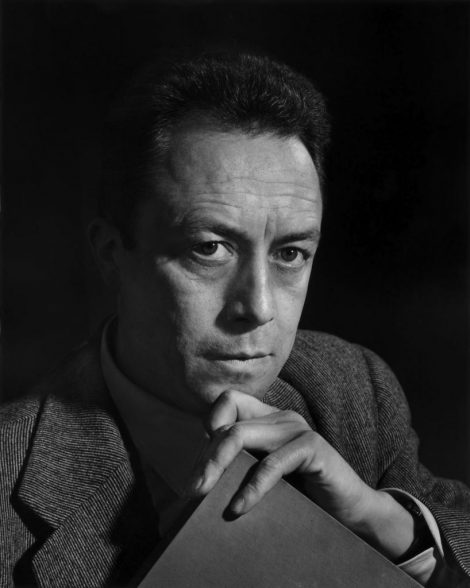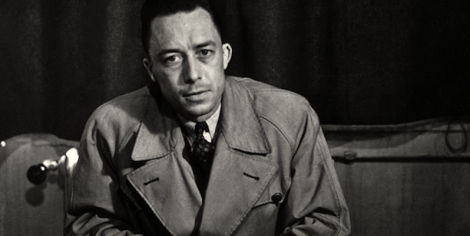The French novelist and philosopher Albert Camus was a terrifically good-looking guy whom women fell for helplessly—the Don Draper of existentialism. This may seem a trivial thing to harp on, except that it is almost always the first thing that comes up when people who knew Camus talk about what he was like. When Elizabeth Hawes, whose lovely 2009 book “Camus: A Romance” is essentially the rueful story of her own college-girl crush on his image, asked survivors of the Partisan Review crowd, who met Camus on his one trip to New York, in 1946, what he was like, they said that he reminded them of Bogart. “All I can tell you is that Camus was the most attractive man I have ever met,” William Phillips, the journal’s editor, said, while the thorny Lionel Abel not only compared him to Bogart but kept telling Hawes that Camus’s central trait was his “elegance.” (It took the sharper and more Francophile eye of A. J. Liebling to note that the suit Camus wore in New York was at least twenty years out of Parisian style.)
Camus liked this reception enough to write home about it to his French publisher. “You know, I can get a film contract whenever I want,” he wrote, joking a little, but only a little. Looking at the famous portrait of Camus by Cartier-Bresson from the forties—trenchcoat collar up, hair swept back, and cigarette in mouth; long, appealing lined face and active, warm eyes—you see why people thought of him as a star and not just as a sage; you also see that he knew the effect he was having.

It’s perfectly reasonable, then, that a new book by Catherine Camus, his surviving daughter, “Albert Camus: Solitude and Solidarity” (Edition Olms), is essentially a photograph album, rather than any sort of philosophical gloss. Looks matter to the mind. Clever people are usually compensating for something, even if the wound that makes them draw the bow of art is no worse than an overlarge schnozz and sticking-out ears. The ugly man who thinks hard—Socrates or Sartre—is using his mind to make up for his face. (Camus once saw Sartre over-wooing a pretty girl and wondered why he didn’t, as Camus would have done, play it cool. “You’ve seen my face?” Sartre answered, honestly.) When handsome men or beautiful women take up the work of the intellect, it impresses us because we know they could have chosen other paths to being impressive; that they chose the path of the mind suggests that there is on it something more worthwhile than a circuitous route to the good things that the good-looking get just by showing up.
And then the image of Camus persists—we recall him not just as a fine writer but as an exemplary man, a kind of secular saint, the spirit of his time, as well as the last French writer whom most Americans know something about. French literary critics sometimes treat him with the note of condescension that authors of high-school classics get here, too—a tone that the French writer Michel Onfray, in his newly published life of Camus, “L’Ordre Libertaire,” tries to remedy, insisting that Camus was not only a better writer but a more interesting systematic thinker than Sartre.
The skepticism of his native readers isn’t just snobbish, though. Read today, Camus is perhaps more memorable as a great journalist—as a diarist and editorialist—than as a novelist and philosopher. He wrote beautifully, even when he thought conventionally, and the sober lucidity of his writing is, in a sense, the true timbre of the thought. Olivier Todd, the author of the standard biography in French, suggests that Camus might have benefitted by knowing more about his anti-totalitarian Anglo-American contemporaries, Popper and Orwell among them. Yet in truth the big question Camus asked was never the Anglo-American liberal one: How can we make the world a little bit better tomorrow? It was the grander French one: Why not kill yourself tonight? That the answers come to much the same thing in the end—easy does it; tomorrow may be a bit better than today; and, after all, you have to have a little faith in people—doesn’t diminish the glamour that clings to the man who turned the question over and looked at it, elegantly, upside down.

In America, Camus is, first of all, French; in France he remains, most of all, Algerian—a Franco-Algerian, what was later called a pied noir, a black foot, meaning the European colonial class who had gone to Algeria and made a home there. A dense cover of clichés tends to cloud that condition: just as the writer from Mississippi is supposed to be in touch with a swampy mysterious identity, a usable past, that no Northern boy could emulate, the “Mediterranean” man is assumed in France to be in touch with a deep littoral history. Camus had that kind of mystique: he was supposed to be somehow at once more “primitive”—he was a strong swimmer and, until a bout of tuberculosis sidelined him, an even finer football player—and, because of his Mediterranean roots, more classical, in touch with olive groves and Aeschylus. The reality was grimmer and more sordid. His father, a poorly paid cellarman for a wine company, was killed in battle during the First World War, when Camus was one. His mother was a maid, who cleaned houses for the wealthy French families. Though he was, as a young man, sympathetic to Algerian nationalism, he understood in his marrow that the story of colonialist exploitation had to include the image of his mother on her knees, scrubbing. Not every colonial was a grasping parasite.
Camus was a first-rate philosophy student, and the French meritocratic system had purchase even in the distant province. He quickly advanced at the local university, writing a thesis on Plotinus and St. Augustine when he was in his early twenties. After a flirtation with Communism, he left for the mainland in 1940, with the manuscript of a novel in his suitcase and the ambition to be a journalist in his heart. He worked briefly for the newspaper Paris-Soir, and then returned to North Africa, where he finished two books. By 1943, he was back in France, to join the staff of the clandestine Resistance newspaper Combat, and publish those books: first the novel “The Stranger” and then a book of philosophical essays, “The Myth of Sisyphus.” Part of the paralyzing narcotic of the Occupation was that writing could still go on; it was in the Germans’ interest to allow the publication of books that seemed remote enough not to be subversive.

The novel and the essays announced the same theme, though the novel did it on a downdraft and the essays on uplift: meaning is where you make it and life is absurd. In the novel, Camus meant absurd in the sense of pointless; in the essays in the sense of unjustified by certainty. Life is absurd because Why bother? And life is also absurd because Who knows? “The Stranger” tells the story of an alienated Franco-Algerian, Meursault, who kills an Arab on the beach one day for no good reason. The no-good-reason is key: if it’s possible to act for no good reason, maybe there is never any reason to talk about “good” when you act. The world is absurd, Meursault thinks (and Camus seconds), because, without divine order, or even much pointed human purpose, it’s just one damn thing after another, and you might as well be damned for one thing as the next: in a world bleached dry of significance, the most immoral act might seem as meaningful as the best one. The drained, eye-straining beach where Meursault murders his victim is a place not just without meaning but without real feeling—it became the deadened landscape, and the cityscape, that was populated in the decade by everyone from Giacometti’s emaciated walking figures to Bogart’s private eyes.

You must be logged in to post a comment Login